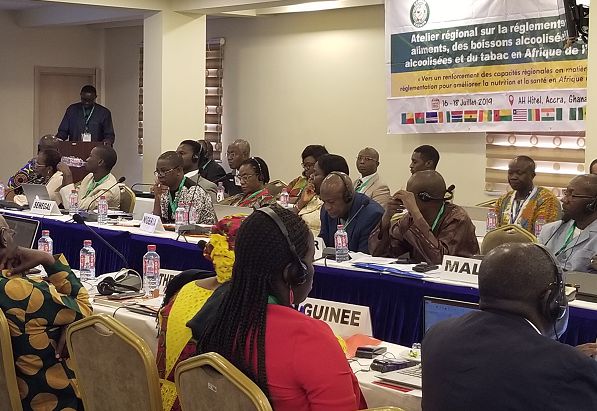
WAHO deliberates to reduce non-communicable diseases
Members of the West African Health Organisation (WAHO) have begun a consultative meeting in Accra to fashion measures to reduce the increasing burden of non-communicable diseases (NCDs) which cause over 1.2 million deaths in the region annually.
More than 50 stakeholders, including experts from the 15-member-country organisation, including Ghana, are attending the three-day workshop, which is on the theme: "Towards strengthening regional capacity in regulation for improved nutrition and health in West Africa”.
Participants include policy makers, public health practitioners, economists, lawyers, politicians, scientists, pharmacists, agriculturists, sociologists, psychologists, journalists, customs officials, trade experts and tax experts.
Among matters to be deliberated upon are regulations on food, alcoholic, non-alcoholic drinks and tobacco in West Africa.
Participants will also discuss ways to strengthen the capacity of member countries to be able to deal effectively with NCDs.
NCDs such as stroke, cancer, diabetes and chronic lung and heart diseases are collectively responsible for almost 70 per cent of all deaths worldwide, with more than 50 per cent of the cases being preventable.
Significance
In a speech read on his behalf at the opening of the conference in Accra on Tuesday, the Minister of Health, Mr Kwaku Agyemang-Manu, underscored the importance of the meeting, since it would also focus on the contribution of regulatory agencies in addressing NCDs which exerted a heavy burden on health budgets globally.
He said although NCDs were basically lifestyle diseases, regulation and enforcement were key in addressing the burden NCDs imposed on countries because they were related to the use and sale of food, alcohol and tobacco.
He said containing NCDs should be an integral part of WAHO’s goals to enable member countries to achieve the Sustainable Development (SDG) Goal Three on good health and wellbeing for all ages.
Collaborations
The World Health Organisation (WHO) Country Representative in Ghana, Dr Owen Kaluwa, called for collective action by all member states to bring about a reduction in NCDs in West Africa.
“Indeed, the NCD epidemic will only be fought and won by the concerted effort of all relevant sectors and stakeholders working together. I am glad, therefore, to see that regulatory agencies in West Africa have been brought together to this workshop to discuss how you can strengthen roles as key stakeholders to address NCDs. For this, I wish once again to commend WAHO,” he said.
He noted that to find comprehensive solutions to NCDs, member countries needed to develop multi-sectoral national strategic plans and policies to guide the work and response of all stakeholders involved.
“This also means that as we pursue universal health coverage, we should ensure that the package of essential services we are offering includes interventions to address NCDs through the continuum of promotive, preventive, curative and rehabilitative services building on primary health care,” he added.
Medical evacuations
A Professional Officer, Non-Epidemics and Non-Transmittable Diseases at WAHO, Dr William Bonsu, said NCDs were a common cause of medical evacuation, which was increasingly affecting young people, rural communities and poor households.
“Emerging trends, including e-cigarettes, shisha, drug abuse, sedentarism from television, mobile phones and video games and increased advertising from traditional medicine practitioners are contributory factors to the high burden,” he said.
He mentioned other contributory factors as the aggressive advertising of sweetened beverages, alcoholic drinks, including bitters, through traditional and social media outlets, non-existent laws and poor enforcement of existing ones, coupled with limited access to affordable care and limited political will.
“Regulatory agencies have the primary responsibility in law to protect the public from unhealthy products and exploitation by producers and traders,” he said.
Writer’s email:
